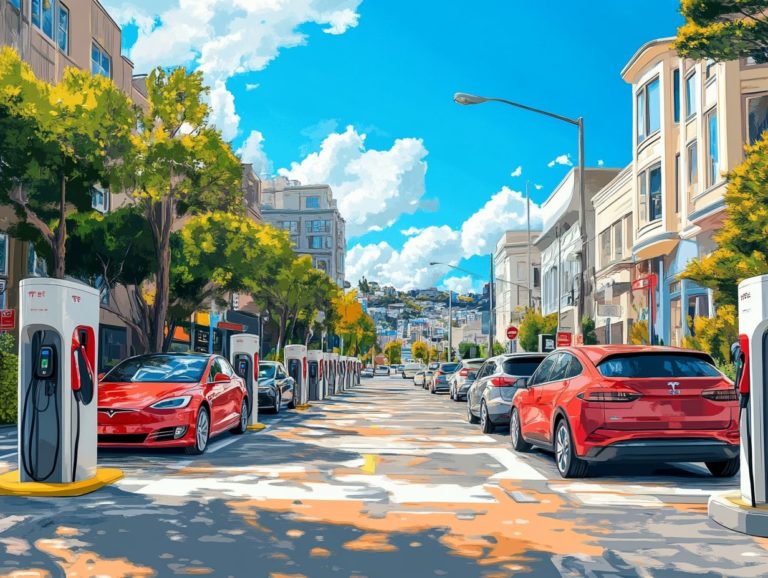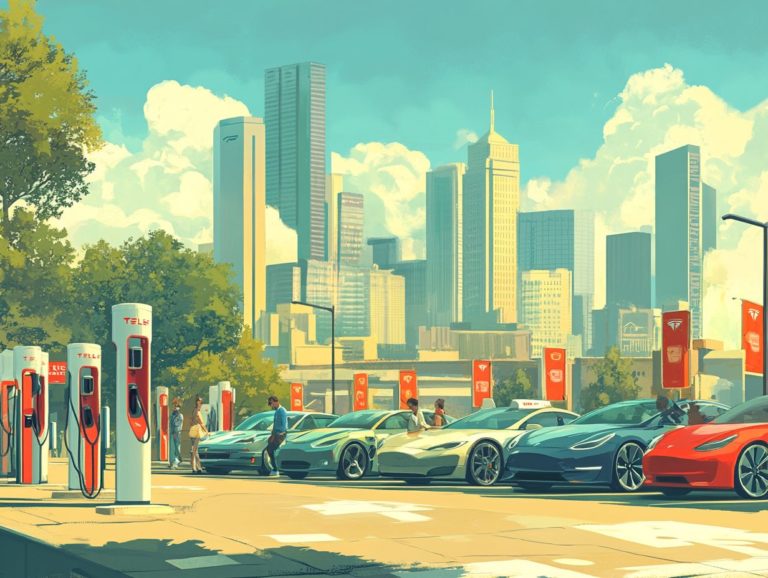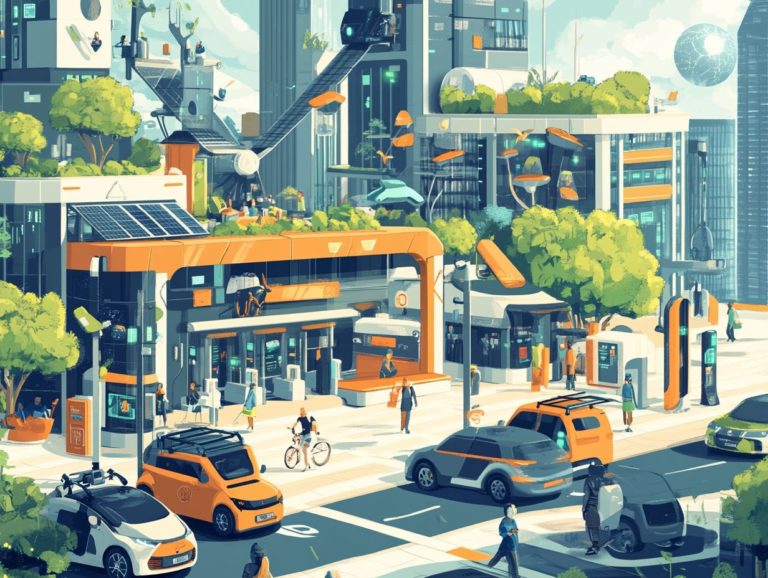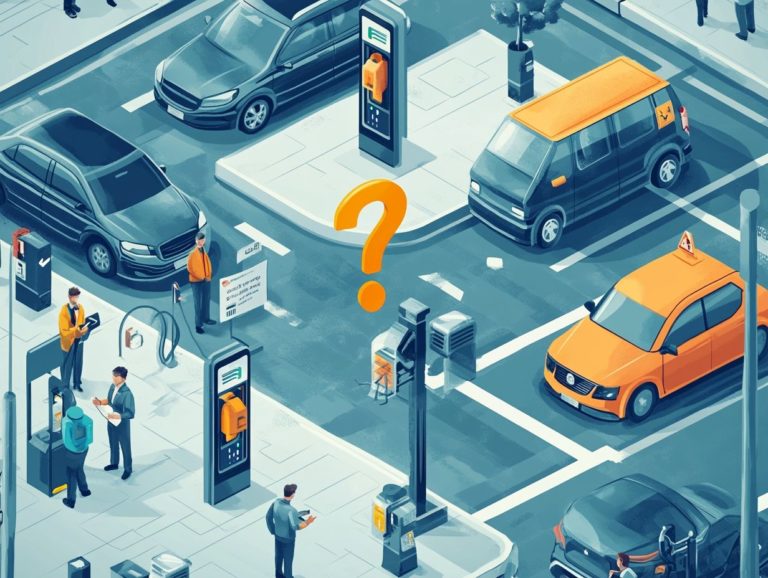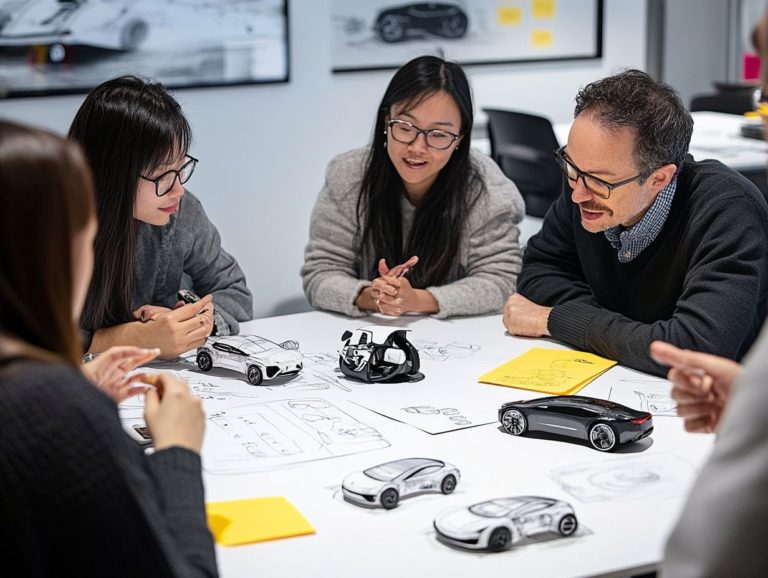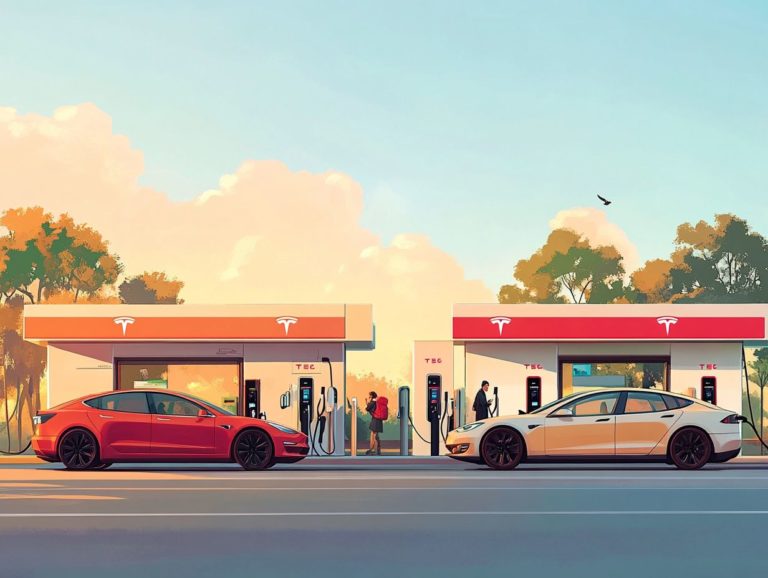Top 10 Electric Vehicle Innovations of 2024
As the electric vehicle (EV) landscape evolves, 2024 promises to usher in a remarkable array of innovations that will redefine your driving experience.
From revolutionary wireless charging technology to cutting-edge driver assistance systems, these advancements not only enhance vehicle performance but also foster a more sustainable future.
This article delves into the top 10 innovations shaping the EV industry, highlighting their potential environmental benefits and what they mean for the affordability and accessibility of electric vehicles. Get excited for these thrilling changes ahead!
Contents
- Key Takeaways:
- 1. Wireless Charging Technology
- 2. Solid-State Batteries
- 3. Vehicle-to-Grid Technology
- 4. Self-Driving Capabilities
- 5. Advanced Driver Assistance Systems
- 6. Improved Range and Battery Life
- 7. Lightweight and Durable Materials
- 8. Augmented Reality Windshields
- 9. Solar Panel Integration
- 10. Artificial Intelligence Integration
- What Is the Current State of Electric Vehicles?
- How Will These Innovations Impact the Electric Vehicle Industry?
- What Are the Environmental Benefits of Electric Vehicles?
- What Are the Potential Drawbacks of These Innovations?
- How Will These Innovations Affect the Cost of Electric Vehicles?
- What Are the Predictions for the Future of Electric Vehicles?
- Frequently Asked Questions
- 1. What are the top 10 electric vehicle innovations to look out for in 2024?
- 2. Will there be any significant advancements in battery technology for electric vehicles in 2024?
- 3. Are there any new electric vehicle models expected to be released in 2024?
- 4. What advancements can we expect to see in the charging infrastructure for electric vehicles in 2024?
- 5. Will there be any improvements in the range of electric vehicles in 2024?
- 6. What impact will these electric vehicle innovations have on the environment?
Key Takeaways:
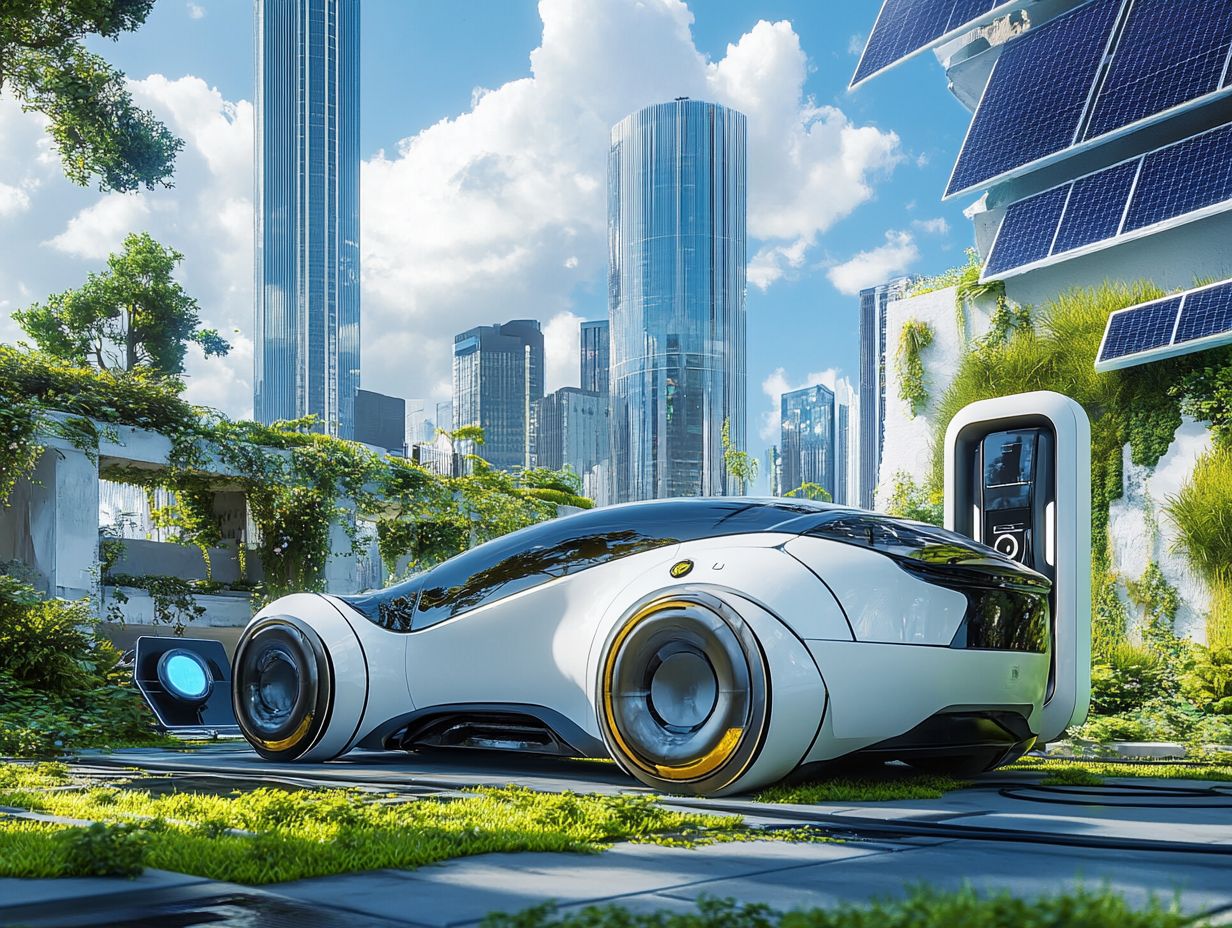
- Wireless charging technology makes charging hassle-free.
- Solid-state batteries promise longer ranges and faster charging.
- Vehicle-to-grid technology turns your EV into a power source.
1. Wireless Charging Technology
Wireless charging technology is transforming the electric vehicle landscape, offering you a seamless and efficient way to power vehicles like the Tesla Cybertruck and Hyundai Ioniq. This innovation enhances your convenience while addressing the needs of an eco-conscious society, making electric vehicles even more appealing to you as a potential buyer.
Utilizing a method that uses magnets to transfer energy without physical connections, this technology frees you from the hassle of tangled cables. Simply park over a charging pad, and the process begins effortlessly.
The benefits of wireless charging extend beyond convenience; it significantly reduces wear and tear on charging ports and can be integrated into public spaces, ensuring wider accessibility for all.
Models such as the BMW iX and Mercedes EQS are already embracing this feature, paving the way for seamless integration into future EV designs. The implications for fast charging are substantial, enabling rapid power delivery without physical connections, thereby advancing sustainable transportation and helping to lessen reliance on fossil fuels.
2. Solid-State Batteries
Solid-state batteries are poised to revolutionize battery technology for electric vehicles, including those from Kia and BYD Auto. With their superior energy density and enhanced safety features, these innovations promise to extend EV range and deliver significant performance upgrades.
By eliminating flammable liquid electrolytes found in conventional lithium-ion batteries, they substantially reduce fire risks, elevating overall safety. Their impressive longevity translates to longer life cycles some estimates suggest they could last up to twice as long as traditional options.
This makes them particularly well-suited for electric SUVs that require both durability and efficiency. Major players like Tesla and Ford are exploring solid-state technology, which could lead to improved charging times and greater driving ranges, potentially transforming the electric vehicle landscape and establishing a new benchmark in the automotive industry.
3. Vehicle-to-Grid Technology
Vehicle-to-grid technology offers you a remarkable opportunity to engage with the power grid, allowing you to play a vital role in combating climate change while enjoying a sustainable experience through energy trading and storage capabilities.
This innovative approach lets your electric vehicle charge during off-peak hours, when renewable energy production peaks, and discharge stored energy back into the grid when demand surges.
By enabling this two-way flow of electricity, the technology allows you to take advantage of the fluctuating energy market, potentially earning income while championing cleaner energy sources. As a result, this advancement can significantly reduce carbon emissions, paving the way for a greener future.
It also dynamically influences the evolving electric vehicle market, encouraging broader adoption and improved infrastructure integration.
4. Self-Driving Capabilities
Self-driving capabilities are at the forefront of innovation in electric vehicles. Manufacturers like Tesla are leading the way in integrating autonomous driving technologies.
This not only enhances user convenience but also elevates performance upgrades while navigating the complexities of urban environments.
These advancements bring features such as adaptive cruise control, lane-keeping assist, and automatic emergency braking into the mix, all working together to raise safety standards. Other key players, such as Waymo and Ford, are making their marks too, each honing their unique approaches to navigation systems and AI algorithms.
The ultimate goal of these enhancements is to minimize human error, optimize traffic flow, and deliver a smoother, more enjoyable driving experience. As technology continues to advance, you can anticipate even more sophisticated functionalities that will expand the horizons of what autonomous vehicles can achieve.
5. Advanced Driver Assistance Systems
Advanced Driver Assistance Systems (ADAS) are rapidly becoming standard in electric vehicles. These systems provide you with cutting-edge safety solutions and performance enhancements that elevate your driving experience while reducing the risk of accidents.
These systems feature technologies that enhance road safety and driving enjoyment. For instance, adaptive cruise control automatically adjusts your speed based on traffic flow, offering a smoother ride that helps minimize fatigue during long journeys.
Lane-keeping assist helps keep your vehicle centered in its lane by giving gentle nudges when needed to prevent any unintended drifting.
Emergency braking systems are another game-changer. They can detect potential collisions and apply the brakes on their own, significantly lessening the impact of accidents.
These advancements boost safety and instill confidence in drivers, making your EV experience both enjoyable and secure.
6. Improved Range and Battery Life
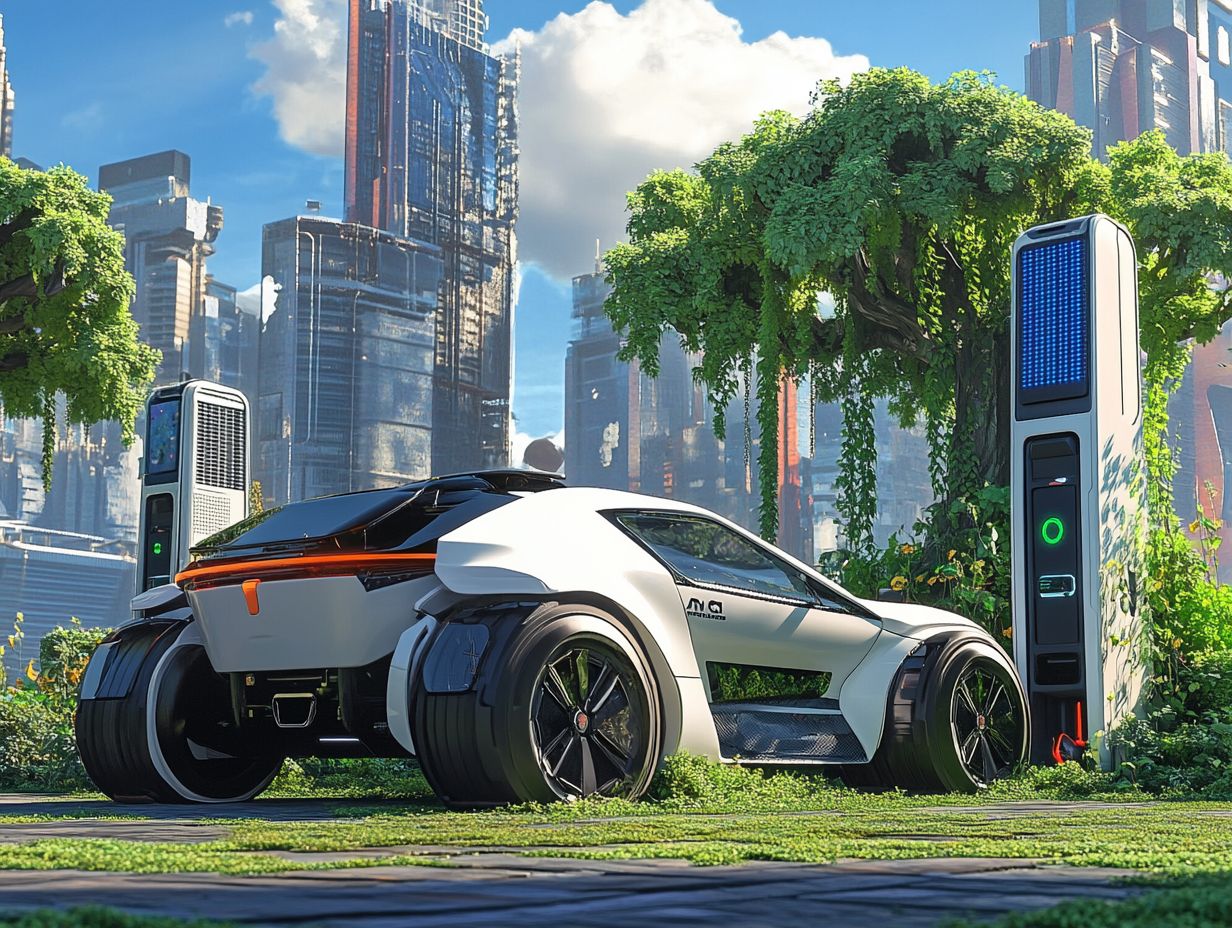
Improved range and battery life are crucial for electric vehicles. Companies like Hyundai and BYD push battery technology to meet your needs for longer journeys and superior performance upgrades.
By investing in cutting-edge advancements like solid-state batteries a new type of battery that holds energy better and lithium-sulfur technologies, these companies aim to significantly elevate energy density and overall efficiency.
This innovation not only alleviates range anxiety a common concern among potential EV buyers but also strengthens your confidence in the long-term durability of these vehicles.
As you increasingly recognize that electric cars can now rival traditional combustion engines regarding mileage and longevity, the adoption rate is set to skyrocket. These advancements make electric vehicles a more practical choice for both daily commuting and long-distance travel.
7. Lightweight and Durable Materials
The use of lightweight and durable materials is transforming electric vehicle design. Companies like Kia and Audi are boosting efficiency and handling without compromising strength.
These cutting-edge materials, such as carbon fiber and aluminum, help minimize overall weight, resulting in enhanced energy consumption and range.
Take the Audi e-tron, for example; it extensively utilizes aluminum in its body structure to optimize weight while delivering impressive rigidity.
On the other hand, the Kia EV6 incorporates carbon fiber elements into its design, boosting both aesthetics and functionality.
As more automakers lean into these advanced materials, the electric vehicle landscape is set to evolve, hinting at a future filled with faster, more efficient, and sustainable transportation solutions.
8. Augmented Reality Windshields
Augmented reality windshields are a game-changer for electric vehicles. They provide you with real-time information that elevates the autonomous driving experience just look at the latest models from Tesla and Hyundai.
These sophisticated systems project essential navigational data onto the glass. This allows you to keep your eyes on the road while accessing critical information such as upcoming turns, speed limits, and potential hazards.
This technology enhances your situational awareness and boosts safety by lightening your cognitive load. It makes it easier to use your vehicle.
This technology is evolving quickly, promising an exciting future. It paves the way for seamless integration with fully autonomous systems, ensuring a smoother transition for you into the future of transportation.
9. Solar Panel Integration
Solar panel integration in electric vehicles marks a remarkable leap towards sustainability. You can witness manufacturers like Volkswagen and Ford harness renewable energy directly from the sun.
This cutting-edge technology also boosts the energy efficiency of these vehicles. It reduces reliance on fossil fuels, making a tangible contribution to a cleaner environment.
By incorporating solar panels, your electric vehicle can charge its batteries even while parked. This extends its range and minimizes your charging needs.
Models like the Hyundai Ioniq 5 and the innovative light electric vehicle from Aptera beautifully exemplify this feature. They tap into the sun s abundant energy.
As the automotive industry evolves, embracing solar technology may set the stage for lower carbon footprints. It can play a crucial role in the fight against climate change.
10. Artificial Intelligence Integration
Artificial intelligence integration in electric vehicles is transforming how you interact with your car. This drives advancements in autonomous driving and performance upgrades that enhance your experience.
This groundbreaking technology streamlines navigation systems by providing real-time traffic updates. It optimizes routes, making every journey smoother.
It also boosts predictive maintenance capabilities, allowing your vehicle to anticipate potential issues before they escalate. This ensures it remains in peak condition.
The intelligence embedded within your EV fosters continuous learning. It adapts to your driving habits and preferences.
As the synergy between AI and electric mobility evolves, extraordinary innovations are poised to reshape the entire automotive landscape. The EV market stands on the brink of significant change.
What Is the Current State of Electric Vehicles?
The current landscape of electric vehicles is marked by swift technological advancements and a surging market demand. Industry giants like Tesla, BYD, Kia, and Hyundai are united in their mission to fight climate change while enhancing the sustainable experience for consumers.
As they innovate, they re rolling out more efficient models. They are also diversifying their offerings with electric trucks and compact city cars, each tailored to meet specific consumer needs.
Recent trends show a notable shift in public perception. Buyers are increasingly embracing electric options and becoming more aware of their environmental impact.
Ongoing improvements in battery technology and charging infrastructure are solidifying the market. These developments make electric vehicles a practical choice for daily transportation.
The implications of these advancements point toward a future where electric cars could dominate the roads. This paves the way for cleaner cities and reduced reliance on fossil fuels.
How Will These Innovations Impact the Electric Vehicle Industry?
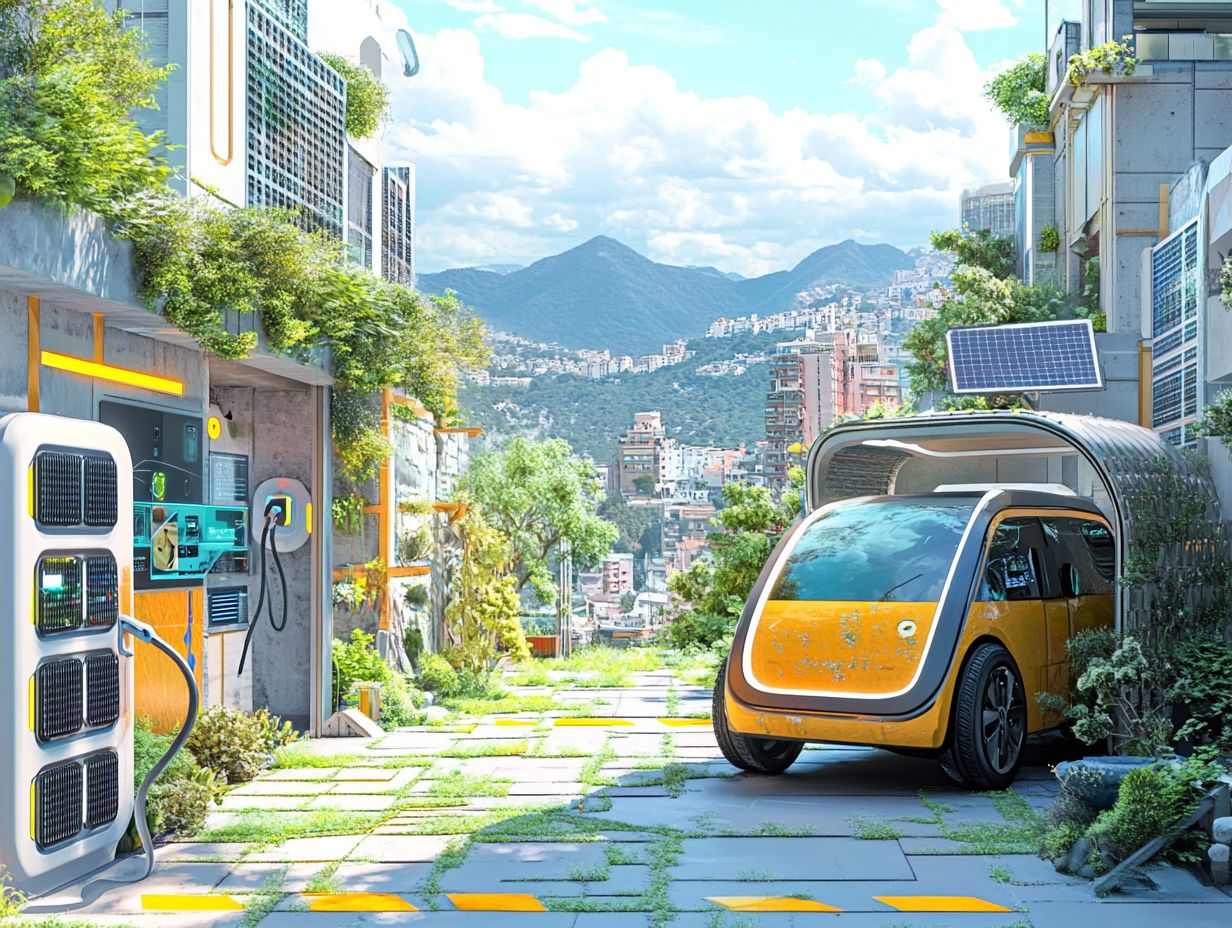
Innovations in electric vehicle technology are reshaping the EV market, leading to enhanced performance upgrades and increased consumer adoption. For those looking for affordable options, checking out the top 5 budget-friendly EVs in 2024 can be quite beneficial.
This change can inspire more consumers who care about the environment. It makes electric vehicles more appealing across diverse demographics.
As battery efficiency and charging infrastructure improve, they promise to tackle range anxiety. This evolution will invite you to be part of a transformative movement in transportation.
With the rise of smart technologies and software integration, manufacturers can customize their offerings. This will elevate the driving experience and enhance the overall environmental impact.
What Are the Environmental Benefits of Electric Vehicles?
Electric vehicles offer fantastic environmental benefits! They significantly lower greenhouse gas emissions and promote a sustainable lifestyle through innovations like efficient charging stations and renewable energy integration.
By moving away from fossil fuels, you play a vital role in combating climate change. These vehicles produce zero tailpipe emissions and can be powered by clean energy sources.
Electric vehicles also enhance energy efficiency. They leverage advanced technologies to optimize battery performance and minimize energy waste during your journeys.
The rise of EVs promotes a circular economy. It emphasizes the recycling of batteries and the sustainable sourcing of materials.
These advancements are crucial for improving air quality and ensuring a resilient planet for generations to come!
What Are the Potential Drawbacks of These Innovations?
While innovations in electric vehicles (EVs) bring exciting advancements, they also present potential drawbacks. You may find yourself facing concerns about battery technology, production costs, and sustainability.
One major challenge lies in current battery technology limitations, particularly energy density and longevity. This not only fuels range anxiety but also raises questions about the environmental consequences of raw material extraction.
The infrastructure for widespread EV adoption, such as charging stations, is still lacking. This creates additional barriers for you to navigate.
Consumer acceptance is another critical factor. Potential buyers like yourself might hesitate due to perceived inconveniences or upfront costs.
Fortunately, ongoing research is working tirelessly to tackle these challenges. This includes the development of better battery chemistries and broader initiatives to establish a comprehensive charging network.
How Will These Innovations Affect the Cost of Electric Vehicles?
Ongoing innovations in electric vehicle technology are set to influence EV costs. This creates both challenges and opportunities for you as a consumer in this evolving market.
As the industry adopts advanced production techniques and materials, you might see reduced manufacturing costs. This could lead to lower retail prices over time.
This shift may attract a broader range of customers, driven by a growing awareness of environmental issues and government incentives.
With competition heating up among automakers, expect strategic pricing adjustments. These will captivate consumers like yourself, especially in a market focused on sustainability.
These interconnected factors will ultimately shape the future of electric vehicle affordability for you and others.
What Are the Predictions for the Future of Electric Vehicles?
The future of electric vehicles presents exciting opportunities. Advancements in technology, growing consumer interest, and a commitment to sustainability by manufacturers like Tesla and Ford are transforming the automotive world.
Rapid innovations are enhancing battery technologies for longer ranges. More efficient charging infrastructure is also being developed.
Awareness of environmental issues is shaping market dynamics. This awareness is driving demand for greener alternatives.
This shift changes how you view car ownership. It paves the way for a future with lower carbon footprints and healthier ecosystems.
Frequently Asked Questions
1. What are the top 10 electric vehicle innovations to look out for in 2024?
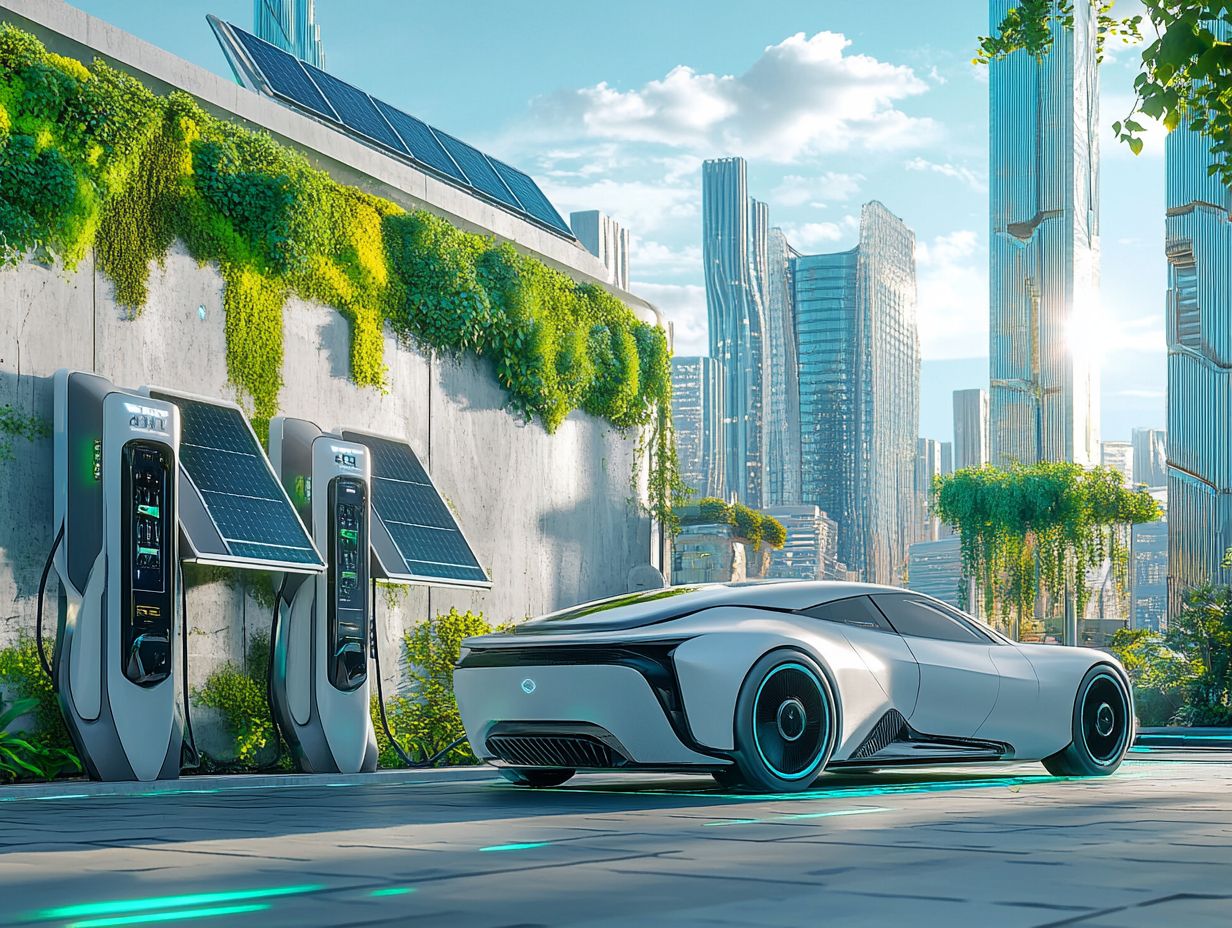
Some top electric vehicle innovations expected in 2024 include longer battery range, faster charging times, improved connectivity, advanced safety features, enhanced autonomous driving capabilities, and a closer look at the top 5 electric SUVs of 2024 that offer more affordable options.
2. Will there be any significant advancements in battery technology for electric vehicles in 2024?
Yes, several innovations in battery technology are expected in 2024. For example, solid-state batteries use solid materials instead of liquids, promising longer range and faster charging times. Additionally, the latest innovations in EV technology like lithium-sulfur batteries could also be lighter and more energy-dense.
3. Are there any new electric vehicle models expected to be released in 2024?
Yes, several new electric vehicle models are anticipated in 2024, including the Tesla Model 2, a compact and more affordable option from Tesla, and the Ford F-150 Electric, a fully-electric version of the popular pickup truck.
4. What advancements can we expect to see in the charging infrastructure for electric vehicles in 2024?
In 2024, we will likely see more widespread and efficient public charging stations. Advancements in wireless charging technology will also make it easier and more convenient to charge electric vehicles on the go.
5. Will there be any improvements in the range of electric vehicles in 2024?
Yes, significant improvements in the range of electric vehicles are expected in 2024. Some models are predicted to have a range of over 500 miles on a single charge, thanks to advancements in battery technology and more efficient energy usage.
6. What impact will these electric vehicle innovations have on the environment?
The advancements in electric vehicle technology expected in 2024 will positively impact the environment. With longer ranges and faster charging times, top EVs for families will become a more feasible option for daily use, reducing reliance on gas-powered cars and ultimately decreasing carbon emissions.

